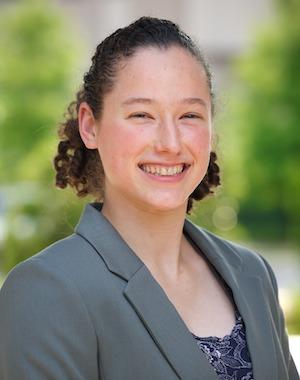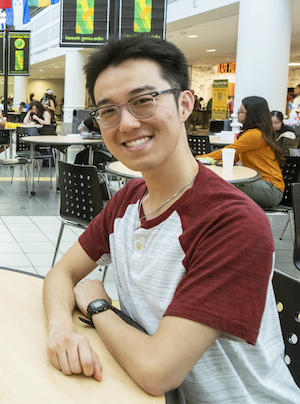Unpaid internships, while often touted as a necessary gateway to a dream job, can pose unexpected barriers for students who may lack the funds for a professional wardrobe or child care, or who simply can’t take on extra hours in addition to working part- or full-time jobs.

Traditionally, the benefits of the internship experience have been used to justify the lack of pay. George Mason University is anything but traditional, and instead is mindful of these economic barriers that can keep qualified students from taking an unmissable opportunity.
And that’s where Mason’s commitment to access via the Scholarship for Unpaid Internships comes in. Open to all undergraduate and graduate Mason students, the scholarship offers a much-needed infusion of funding that can often mean the difference in allowing a student to take on a career advancement opportunity without compromising themselves financially.
According to Saskia Campbell, executive director of University Career Services (UCS), Mason is filling a gap that can make all the difference in a student’s future. “Internships lead to job offers and higher starting salaries, and University Career Services is focused on creating more inclusive pathways for students to gain relevant experience,” said Campbell.
Since being established in 2017, the scholarship has grown significantly. According to Rebekah Truog, office manager at UCS, 160 students have thus far benefited from the scholarship with close to $250,000 distributed. Initial funding for the scholarship came from the University Life Parents Fund, which continues to occasionally contribute.

“Most of our funding comes directly from revenue from our Career Fairs,” said Truog. “We also get funding from our Employer Partner Program, as well as direct donations to Career Services. Of those direct donations, 100 percent goes to funding for the scholarship.”
And with those funds, students get to take on opportunities that can make a real difference in securing a career in their dream field after graduation. Among the organizations that Mason students have interned with and gained valuable experience from, Truog noted that many are community health organizations, nonprofits, the federal government, or nongovernmental organizations.
For some of these students, an internship is necessary to gain professional hours required for licensure. This was the case for Nathan Park, who is pursuing an MEd in counseling and development, with a concentration in clinical mental health counseling.
“My internship allowed me to obtain counseling hours so that I may apply for licensure in the state of Virginia,” said Park. “Receiving the scholarship alleviated my financial distress in paying for gas and rent.”
Kinesiology major Kayleigh Newman received the scholarship this past fall to intern at Innovative Physical Therapy and Wellness. “Being exposed to my field [physical therapy], getting to be hands on…and being inspired by seeing the things I am learning in practice” were all benefits of her internship, she said. “My internship has really confirmed to me that this is the right career path for me.”

Yuliana Rud, a tourism and events management major, echoes the sentiment. Rud interned in Argentina with Hola Veggie, a plant-based meal kit company. “I’m now more sure than ever that the major and career path I’ve chosen is right for me, and this internship was a big factor in that,” she said. “The scholarship helped cover daily costs while I was living in a different country, such as travel expenses, groceries, and materials for my work.”
Mason alum Austin McManus, BA History ’17, MA History ’18, was one of the first students to benefit. The scholarship helped pay for his housing in Washington, D.C., where he interned for the History Office at the National Archives.
“My time working at the National Archives was an important step in my professional career as a history educator,” said McManus, who is leads the History/Art Department at Fusion Academy, Tysons. “It was essentially the first time working as a historian in the professional world, and I developed important skills that I use in my current role.”
Read More Internship Stories
- February 12, 2026
- February 6, 2026
- December 1, 2025
- November 13, 2025
- October 23, 2025
This content appears in the Spring 2024 print edition of the Mason Spirit Magazine as part of "Career-Ready, Set, Go."
